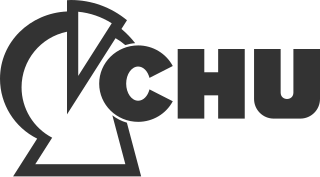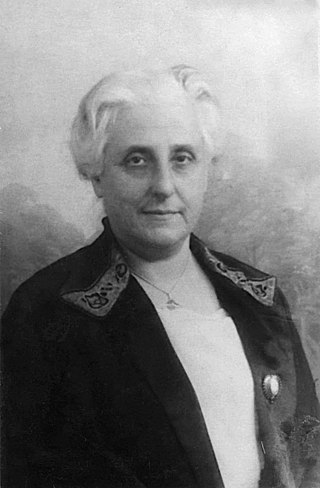
The People's Party for Freedom and Democracy is a conservative-liberal political party in the Netherlands. The VVD, whose forerunner was the Freedom Party, is a party of the centre-right that tries to promote private enterprise and economic liberalism.

The Christian Democratic Appeal is a Christian democratic and conservative political party in the Netherlands.
Liberalism in the Netherlands started as an anti-monarchical effort spearheaded by the Dutch statesman Thorbecke, who almost single-handedly wrote the 1848 Constitution of the Netherlands that turned the country into a constitutional monarchy.

The Free-thinking Democratic League was a progressive liberal political party in the Netherlands. Established in 1901, it played a relatively large role in Dutch politics, supplying one Prime Minister, Wim Schermerhorn. The League is a predecessor of two of the major Dutch political parties, the conservative liberal People's Party for Freedom and Democracy (VVD) and the social democratic Labour Party (PvdA). The social liberal Democrats 66 also claims that it and the VDB are ideologically connected.

The Radical League was a progressive liberal political party in the Netherlands from its founding in 1892 until it merged with the left wing of the Liberal Union to form the Free-thinking Democratic League in 1901.

General elections were held in the Netherlands on 5 July 1922. They were the first elections held under universal suffrage, which became reality after the acceptance of a proposal by Henri Marchant in 1919 that gave women full voting rights. Almost all major parties had a woman elected. The number of female representatives increased from one to seven. Only the Anti-Revolutionary Party principally excluded women from the House of Representatives. Another amendment to the electoral law increased the electoral threshold from 0.5% to 0.75%, after six parties had won seats with less than 0.75% of the vote in the previous elections.

The Christian Historical Union was a Protestant Christian democratic political party in the Netherlands. The CHU is one of the predecessors of the Christian Democratic Appeal (CDA), into which it merged in September 1980.

The Social Democratic Workers' Party was a Dutch socialist political party existing from 1894 to 1946. Originating from a split in the prior Social Democratic League, the party was a predecessor of the current social democratic Labour Party (Netherlands).

The League of Free Liberals was a Dutch classical liberal political party and a predecessor of the Liberal State Party which is historically linked to the People's Party for Freedom and Democracy, the major Dutch liberal party. The party's name League of Free Liberals was supposed to convey that the party was not a classical political party, with party discipline and a centralised organisation but a league of independent MPs. The conservative liberals were called free liberals before they had founded a separate party.

The Liberal Union was a conservative liberal and progressive liberal political party in the Netherlands. A major party in its time, the Liberals were one of the historic predecessors of the Liberal State Party, and therefore of the People's Party for Freedom and Democracy.

The Social Democratic League was a socialist political party in the Netherlands. Founded in 1881, the SDB was the first socialist party to enter the House of Representatives.

The Economic League was a liberal political party in the Netherlands from 1917 to 1921.

David van Embden, was a Dutch politician, first for the Free-thinking Democratic League, later for the Labour Party.
This article gives an overview of socialism in the Netherlands, including communism and social democracy. It is limited to communist, socialist, social democratic, and democratic socialist parties with substantial support, mainly proved by having had a representation in parliament. The sign ⇒ means a reference to another party in that scheme.

This article gives an overview of Christian democracy in the Netherlands, which is also called confessionalism, including political Catholicism and Protestantism.
The Concentration was a coalition of Dutch liberal parties between 1901 and 1918. The Vrijzinnig Democratische Bond, Liberale Unie and the Bond Vrije Liberalen participated. The main issue which united these parties was universal suffrage and their opposition to equal financing for religious schools. The Concentration governed between 1905 and 1908, led by the Theo de Meester with support of the social-democratic SDAP and 1913 and 1918 led by Pieter Cort van der Linden in an extra-parliamentary cabinet. In 1921 two of the component parties, the League of Free Liberals and the Liberal Union form the Liberal State Party, the Freedom League.

Bertha "Betsy" Bakker-Nort was a Dutch lawyer and politician who served as a member of the House of Representatives for the Free-thinking Democratic League (VDB) from 1922 to 1942.

Hendrik Pieter "Henri" Marchant was a Dutch politician who co-founded the Free-thinking Democratic League (VDB) and served as a member of the House of Representatives from 1900 until 1933, after which he was Minister of Education, Arts, and Science until 1935.

Hendrika Wilhelmina Bernardina "Mien" van Itallie-van Embden was a Dutch lawyer and politician who served as a member of the House of Representatives from 1928 until 1933 for the Free-thinking Democratic League (VDB).

Thiska Thiel-Wehrbein was a Dutch women's rights activist and pacifist. From 1917, she was an active spokesperson for women's rights, children's rights, Dutch disarmament and the left-liberal ‘Vrijzinnig Democratische Bond’ until she had to limit her activities in 1924 due to asthma.












